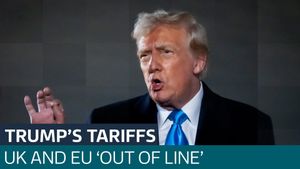Elon Musk has entered the political fray, advocating for the dismantling of the U.S. Agency for International Development (USAID), sparking intense debate and controversy. Earlier this week, Musk revealed during a live session on X Spaces his conversations with former President Donald Trump, stating, "he agreed we should shut it down." Musk characterized USAID not merely as problematic but as fundamentally flawed, describing it as "just a ball of worms" and asserting, "You’ve got to basically get rid of the whole thing. It’s beyond repair." This sentiment echoes the sharply divided opinions surrounding the agency's future.
Established by President John F. Kennedy back in 1961, USAID serves as the arm of the U.S. government tasked with administering civilian foreign aid and development assistance. Recently, it has become the target of Musk, Trump, and certain Republican lawmakers who accuse the agency of promoting liberal ideologies at the expense of fiscal responsibility. Their criticisms coincide with broader efforts by the Trump administration to realign federal spending priorities.
The Trump administration made waves over the weekend by placing two top security chiefs at USAID on leave after they allegedly refused to comply with demands for classified materials to be handed over to Musk’s government inspection teams. Musk went as far as to label USAID as "a criminal organization," providing no evidence for such claims, but asserting it was “time for it to die.” Such rhetoric points to the more extensive restructuring initiatives pushed by Musk's newly formed Department of Government Efficiency (DOGE), which aims to trim government expenditures significantly.
This agitation against USAID isn't just rhetoric; actual actions have been taken. On January 20, 2025, Trump signed Executive Order 14169, titled "Reevaluatin and Realigning United States Foreign Aid." This order enacted a 90-day pause on all U.S. foreign development assistance programs, enabling the administration to assess the effectiveness of these programs against national interests. Trump has criticized USAID vocally, referring to it as having been "run by a bunch of radical lunatics" and asserting, "and we’re getting them out." His administration's claims suggest many of USAID’s activities have become misaligned with U.S. strategic goals.
Responses to these drastic measures from the congressional floor have been predictably polarized. Senator Elizabeth Warren voiced her disapproval, accusing Trump’s administration of granting Musk undue access to sensitive government information and infringing on necessary government functions. "We must do everything in our power to push back and protect people from harm," she stated, highlighting the grave concerns surrounding the ramifications of potentially dismantling USAID.
Critics from various aid organizations are alarmed, warning of impending humanitarian crises should the agency shut down permanently. Many countries dependent on U.S. assistance for economic support, disaster response, and security measures could face significant downturns, raising fears about the vacuum left for rival global powers to exploit.
While confusion reigns over the future of USAID, Secretary of State Marco Rubio was named as the acting head of the agency, following the turmoil spurred by Musk and Trump’s directives. During comments made on-site in El Salvador, Rubio indicated the agency's noncompliance with requests about taxpayer dollar usage was unacceptable. He maintained, "Everything they do has to be in alignment with the national interest and the foreign policy of the United States."
Employees of USAID were informed to work remotely after they unexpectedly received emails announcing the headquarters closure for the day, adding to the disarray within the agency. Some Democratic lawmakers have expressed urgent concerns. Democratic Sen. Andy Kim of New Jersey reminded everyone, "This is an entity created through federal statute, codified through federal statute. It cannot be changed or removed except through actions of Congress." His words reflect the entrenched legal requirements surrounding the agency's operations, implying deep challenges to any administrative attempts at shutdown.
The precarious situation surrounding USAID continues to develop as stakeholders—including agency employees, lawmakers, and international allies—watch closely. The agency, which manages billions of dollars aimed at humanitarian efforts globally, could find its structural foundations shaken by this political repositioning. The stakes are high as questions about foreign assistance's importance to global stability hang heavy, encompassing broader themes of governance, humanitarian obligations, and America's role on the world stage. And as the drama continues to play out, one can only wonder about the lasting impacts these leadership changes will invoke within foreign aid dynamics.



